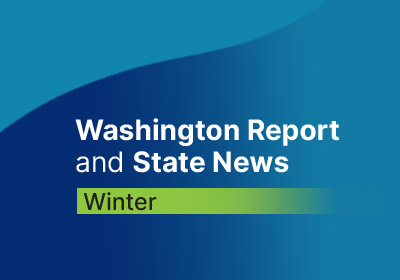Washington Report and State News
Stay Updated On Current Issues
GSE Watch

Regulators Struggle to Address GSE ‘Tips’ on Alleged Appraisal Irregularities
The Appraisal Institute on Dec. 13 reported that through the first three quarters of this year Fannie Mae sent appraiser regulators 1,083 "tips" alleging that some appraisals submitted in conjunction with loans purchased by the government-sponsored enterprises contain "severe deficiencies."

Appraisers Need to Protect Themselves Amid Increased Requests for Form 1007/1000
The Appraisal Institute on Dec. 13 said it is aware of a reported uptick in lender requests for appraisers to complete Form 1007/1000 Single Family Rent Schedule, assignments that are intended to support a loan application or be layered on top of work prepared by others. The requests may be the result of consumers increasingly using rental income to qualify for a mortgage for a second home while maintaining ownership of a primary residence.
On the Hill

Senate Introduces Companion Bill to Reform Appraisal Licensing System
Sens. Jon Tester, D-Mont., and Mike Rounds, R-S.D., on July 27 introduced S 2692, the Portal for Appraisal Licensing Act or “PAL Act,” legislation that is identical to HR 2771, which was introduced in the House on April 20 and addresses modernization of the real estate appraisal licensing system. The Appraisal Institute has long advocated for this type of reform because it can reduce costs and simplify processes for appraisers and those who use the services of appraisers.

Department of the Interior Under Pressure to Speed up Appraisals
The U.S. Department of the Interior’s Appraisal and Valuation Services Office is under increasing pressure from conservation organizations to reduce turnaround times on appraisals for the acquisition of open space. In response, the House and Senate introduced legislation that allows AVSO to utilize the services of any appraiser with a valid certified general credential — with some preference given to local appraisers.
In the Agencies

Appraisal Institute Calls on CFPB to Mandate Disclosure of AMC Fees
The Appraisal Subcommittee on Nov. 1 hosted its third public hearing on appraisal bias, focusing on how residential appraisals are developed and reviewed, the process for reconsideration of value for residential real estate valuations and the development of rural appraisals.

A Look Ahead – Agencies Seeking to Complete Work on Rules, Guidance
The Appraial Institute reported Dec. 13 that work continues within the federal bank regulatory and consumer protection agencies on several proposals that relate to the implementation of the Dodd-Frank Act of 2010 and on housing equity issues advanced by the Biden Administration.

Appraisal Institute Participates in OCC Project Reach on Key Housing Issues
The Appraisal Institute on Dec. 13 announced that its leadership and some staff are participating in workstreams related to housing equity issues that are being facilitated by the Office of the Comptroller of the Currency’s Project REACh, or Roundtable for Economic Access and Change.

IRS Proposes Rule to Limit Syndicated Conservation Easements
The IRS on Nov. 20 announced that it’s seeking comments on proposed regulations that would clarify provisions in the SECURE 2.0 Act of 2022 aimed at preventing partnerships from claiming unwarranted tax deductions for syndicated conservation easement donations.

Biden Administration Releases Plan for Adaptive Reuse of CRE Properties
The Biden Administration on Oct. 27 released a plan to address the growing number of vacant commercial buildings in the nation’s cities and make it easier to convert them to residential use. This is the federal government’s first effort focused on adaptive reuse and it involves the U.S. Department of Transportation and the U.S. Department of Housing and Urban Development as well as public and private stakeholders.
In the States

Affordable Housing Laws in Washington State, City of Spokane Pose Appraisal Challenges
Washington Gov. Jay Inslee on May 8 signed HB 1110, known as the Middle Housing Bill, which requires cities that are subject to the state’s Growth Management Act to allow multiple units of “middle housing” on any lot zoned for residential use. Related, the city of Spokane on Nov. 20 passed an ordinance that removes all density limitations for “middle housing” on lots less than two acres.

State Adoption of PAREA Continues to Grow
Forty-eight states have indicated that they will accept the Practical Applications of Real Estate Appraisal, known as PAREA, as an alternative way for appraisers to satisfy the experience requirements necessary to become licensed.

Appraisal Institute Offers Assistance to Illinois Valuation Task Force
On Dec. 20, the Appraisal Institute’s Manager of State and Industry Affairs Scott DiBiasio met with the Illinois Real Estate Valuation Task Force, offering its resources and assistance as subject matter experts and thought leaders on the subject of valuation bias.

New Jersey Legislature Adjourns Without Passing Appraisal Discrimination Bills
The New Jersey State Legislature adjourned its 2022-2023 session on January 9 without passing two bills intended to address “discriminatory practices in real estate appraisals.”

Appraisal Institute’s Washington Report & State News e-newsletter recaps our recent legislative, regulatory and related efforts at both the state and federal levels, representing the interests of AI members.
Evaluations law, the adoption of PAREA, and appraisal bias are just a few of our ongoing initiatives. Read our current issue and browse the archives to learn more about our efforts over the past decade.

Share Your Issues
Do you have a relationship with critical policymakers? Are you aware of a pressing industry issue or concern? We want to hear about it!
Call any member of the AI Government Relations Committee or Washington office staff with more information.
- Scott Dibiasio, Manager of State and Industry Affairs
202-298-5593 - Brian Rodgers, Manager of Federal Affairs
202-298-5597